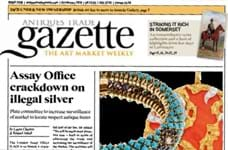Under the scheme, which is open to both association members and non-members, BADA experts will inspect objects to assess whether they can benefit from the worked antique exemption that currently exists for endangered species.
Licences will cost £60 plus VAT, with 10% of this fee donated to wildlife charities working to protect endangered species in their natural habitats.
BADA said the certificates would be “particularly helpful in relation to ivory worked prior to 1947”.
Marco Forgione, BADA chief executive, said: “Between now and whatever legislation happens as a result of the recent DEFRA consultation, the trade needs to be seen to be taking a lead on trading legally.”
The expert panel, whose members are yet to be announced, will establish the age of ivory works of art and confirm that they are worked specimens made before March 3, 1947, as required by existing UK law.
The association will then issue a BADA certificate that will “ensure that buyers and sellers alike and those dealers without sufficient knowledge, can be confident that they are trading legally”.
Dealers contacted by ATG welcomed the move.
Max Rutherston, a leading dealer in netsuke, said he had personally campaigned for a passport scheme for pre-1947 ivory.
“It is great that those dealing in ivory should show themselves to be proactive ahead of any legislation. It casts a good light on our methods and seriousness of intent,” he said.
“This casts a good light on our seriousness of intent
Claudia Hill, who trades miniatures painted on ivory, said the certification scheme “was a positive thing, if it means we can continue to trade”.
BADA secretary general, Mark Dodgson, said: “As the world’s second-largest art market it is essential that the UK remains at the forefront of the battle to end the poaching of elephants and stamp out the illegal trade in ivory.
“BADA and its members believe the trade has a role to play in the global campaign to protect elephants. By making our new certification scheme available to the general public and dealers in the UK, we can ensure that Britain continues to set the standard for integrity and vigilance.”
DEFRA launched its consultation on exemptions to a ban on ivory in October 2017 and it closed on December 29. The government department is currently going through more than 60,000 responses and is expected to give an update on the proposed ban shortly.
Anger over ivory plea
Meanwhile, wildlife charity Born Free has launched an ivory amnesty aimed at people who no longer wish to have any ivory items in their possession. The public can send items to be destroyed until February 28.
However, dealer Michael Baggott is campaigning on Twitter for the public not to send ivory to any animal charity, and instead take it to a museum or a specialist auctioneer or dealer to assess its historic or artistic merit.














